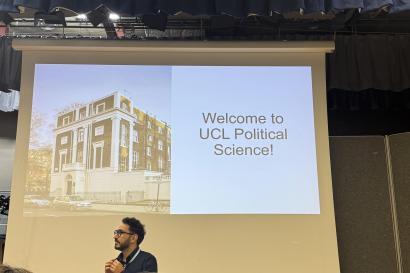It’s easy for me to fool myself into thinking that I’m fluent in Spanish—and therefore, that I can naturally handle any situations that arise abroad—until a situation actually arises and I don’t know how to handle it. It’s funny because the “situations” that challenge me aren’t bad; they’re not even inherently difficult or confusing. They’re stuff that would be thoughtless in English, but are terrifying in another language—explaining to my hair stylist that I need my split ends cut and describing the ombre blonde I’m hoping he can dye my hair. Calling my building manager to let me into my apartment because I left my keys on my nightstand and my host family isn’t home. Communicating to the post-office employee about the ten postcards I want to send to the United States. But by far, the situation that threw me most out of my comfort zone was when I got sick and needed to go to the hospital.
Even in the United States, I don’t like going to doctors’ offices. So when I began sniffling, I stubbornly started carrying tissues in my backpack. When I got a fever, I took some ibuprofen and waited for it to break on its own. When my throat started aching, I drank some tea and powered through. But when it became difficult for me to swallow, I paused. I looked at my throat in a well-lit mirror and saw my tonsils had swelled up to twice their normal size and were covered in white spots. No matter how much I wanted to, I couldn’t ignore what looked like strep throat.
My host family called the 24-hour private concierge doctor that IES Abroad recommends and helped me request a home visit. It was easy. But seven days later, when my antibiotics had run out and my tonsils had gotten worse, my host mom suggested I go to the hospital and I was forced to agree.
I don’t know if it’s just me, but the idea of going to a hospital for strep throat felt wrong—like I was subconsciously expecting to find out that something much worse was wrong with me. Of course, culturally, it’s a lot more common in Argentina to walk into hospitals for non-emergency reasons than it is in the United States; but even after acknowledging that, I still considered hospitals to be the places my family went when I needed stitches or when my sister broke her arm. I had never even been to a hospital without my parents, so going to a Spanish-speaking hospital for my first solo hospital visit seemed like learning to ride a bike without first using training wheels.
Long story short, the hospital wasn’t that scary. I had to wait about three hours before I could see a doctor, but the waiting room had wifi, comfortable seats, and a phone-charging station—heaven. The triaging receptionist spoke English with me, and the two different doctors I saw both spoke Spanish slowly and clearly. After Google-translating a bunch of related words, I didn’t have any trouble describing my symptoms, and the doctors clearly understood how much pain I was in when they looked at my throat, widened their eyes, and told me it looked “muy fea.” I got a steroid injection so I could swallow again and two weeks’ worth of very strong medicine; by the end of the two weeks, my health was perfect.
This story wasn’t really about going to the hospital (even though that’s going to be the only thing my mom remembers about my study abroad experience ten years in the future). It’s about the much more cliché idea of confronting your fears and growing from it. Going to the hospital abroad wasn’t actually frightening—just like getting my hair cut, or talking to my building manager for the first time—it was just intimidating because I had never done it before.
The point of study abroad (other than traveling the world) is to push yourself out of your comfort zone. To widen your horizons. To make you consider the world in ways you didn’t before. If a part of that is feeling uncomfortable and anxious for a little while, then the reward—the relief when a situation is never as difficult as it seemed, the realization that you successfully did something you didn’t think you could, the confidence you feel yourself developing afterwards—is worth it. After every incident, I emerged more independent and more self-assured. If college is the process of transforming from a child into an adult, study abroad is the honors version: the pace is a little quicker, the work is just a little more difficult, but the payoff is that much more satisfying. Also, it’s a great excuse to travel the world.

Maria Oldenburg
I am Maria Oldenburg, and I'm a sophomore Economics and International Studies double major at Case Western Reserve University in Cleveland, Ohio. On campus, you can find me pretending to be a professional photographer, exploring the local coffee scene, or hopelessly planning my dream backpacking trip across Southeast Asia. Originally from Pittsburgh, Pennsylvania, I can't wait to eat my weight in empanadas, learn quality puns in Spanish, and tango with the best of them during my semester in Buenos Aires!







